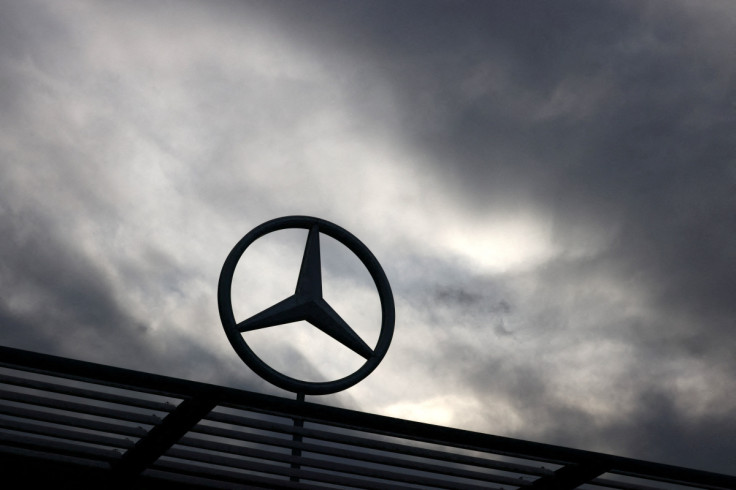Mercedes-Benz CEO Rejects 'Unthinkable' China Decoupling Amid Germany's Autonomy Bid: Report
KEY POINTS
- "Decoupling from China makes no sense," Mercedes-Benz CEO Ola Kaellenius reportedly said
- Some analysts and politicians have expressed doubts about decoupling from China
- German Foreign Minister Annalena Baerbock has taken a firmer stance, calling for stronger China policy
Mercedes-Benz CEO Ola Kaellenius reportedly has told a German newspaper that decoupling with China was "unthinkable" considering how the European country, along with others in the bloc, were "closely intertwined" with the world's second-largest economy.
"That would be unthinkable for almost the entire German industry," Kaellenius was quoted as saying in a Bild am Sonntag report released Sunday, as per Google's translation. The CEO reportedly made the statement when he was asked how cutting ties with China would affect Mercedes-Benz following the discontinuation of the carmaker's business in Russia.
The newspaper also asked Kaellenius how a Chinese invasion of Taiwan would affect the company. "The major players in the world economy, Europe, the USA and China, are so closely entwined that decoupling from China makes no sense. It's about win-win terms of growth and climate protection, not about competing against each other," the business leader reportedly said in response.
Kaellenius reportedly went on to explain that while the COVID-19 pandemic bared the negative side of being dependent on other countries and how this dependence affects global supply chains, "a disengagement from China is an illusion and not desirable either."
Mercedes-Benz and other German automakers rely heavily on the Chinese car market, Reuters reported. The Stuttgart-based auto giant, in particular, has Geely Chairman Li Shufu and Beijing Automotive Group Co. Ltd. as two of its largest shareholders.
Kaellenius reportedly predicted that Mercedes-Benz sales would increase further this year, as the pandemic years saved wealthier Chinese consumers "an extraordinary amount." In turn, the purchasing power of wealthier buyers would benefit the company.
Last year, the Chinese market accounted for 18% of Mercedes-Benz's revenues and 37% of the company's overall car sales.
Some analysts and politicians have previously expressed sentiments similar to those of Kaellenius.
Earlier this month, James Crabtree, executive director of think tank the International Institute for Strategic Studies Asia, wrote for the Financial Times that modern globalization has a complex and interconnected system, which will make even a partial reduction of dependence on China difficult.
French President Emmanuel Macron has also rejected the idea of decoupling from China, noting that the Asian powerhouse can play a "major role" in the Ukraine crisis, as per Bloomberg.
During his state visit to China earlier last month, an official from the French leader's office told reporters that Macron was looking to re-balance China's trade ties with Europe.
In January, German finance minister Christian Lindner reportedly said the country should not resort to a quick decoupling and instead gradually reduce its China dependence.
"Decoupling our economy from the Chinese market would not be in the interest of jobs in Germany," Lindner was quoted as saying by the Welt am Sonntag newspaper, according to Reuters. He added that other regions and markets would gradually have more to offer Germany in the coming years.
Talks of cutting ties with China intensified late last year after German Chancellor Olaf Scholz said depending on one country for energy and trade was a "mistake" that Germany should not repeat, the Deutsche Welle reported.
Scholz's comments reportedly came after concerns emerged about the government's seemingly lax approach toward China.
German economy minister Robert Habeck previously told DW that Germany needed to diversify its Asian business interests so it could reduce dependence on China. Habeck clarified that while Germany wanted to have a trade relationship with China, the government should be "more careful" in approaching "problematic areas."
Meanwhile, German Foreign Minister Annalena Baerbock recently called for a stronger policy that would see lesser German dependence on China.
"We must first all learn from the mistakes of our Russia policy of recent decades," Baerbock said, adding that "one-sided economic dependence exposes us to political blackmail."
Baerbock went on to note that mistakes learned from Germany's dependence on Russian energy should be taken into account "in our policy toward China." She said a Germany-China strategy would be included in a national security strategy being created by the government.
Meanwhile, Germany's main opposition leader, Friedrich Merz, recently called for "close coordination" among European nations in terms of future discussions between Germany and China.
Observers noted that Merz's comments reflected a growing desire among politicians to re-evaluate German policy toward China.

© Copyright IBTimes 2025. All rights reserved.






















